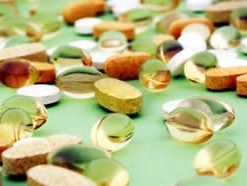
To sort through the maze of advertisements, sales pitches and information about supplements, we need to be educated consumers.
Supplements in the United States are regulated in a limited way by the FDA.
Unlike prescription and over-the-counter drugs, supplements are not subjected to rigorous study and standards before they are allowed on the market. Once on the market, however, the FDA has the authority to monitor their safety and issue warnings or remove products, but this process can take months to years. Manufacturers are expected to follow “good manufacturing practices” (GMPs) in an effort to ensure better consistency and quality, but enforcement is difficult. To this point, studies have discovered wide variations in the concentrations of active ingredients in some supplements. Potentially dangerous contaminants have also been detected at times.
Beware of false and exaggerated claims.
Again, due to lack of regulation, misinformation abounds. Vendors can make health claims about their products (including vitamin and mineral supplements) based on their own review and interpretation of studies, without being held accountable; they simply add a disclaimer that the FDA hasn’t evaluated their claim(s). Keep in mind that many supplements out there are considered unproven remedies. In general, if something sounds too good to be true, it probably isn’t true! The FDA can only pull a product from the market after they prove that it’s dangerous; manufacturers do not bear responsibility for proving anything.
Natural doesn’t always mean safe.
When a supplement is labeled “natural,” we often feel a sense of security, comfort and safety. But think of all the natural substances that can cause harm: tobacco, cocaine, poisonous mushrooms, arsenic and snake venom! Indeed, we need to educate ourselves regarding the potential side effects of the supplements we are taking. They can include drowsiness, irritability, high blood pressure, increased bleeding, rapid heart beat, allergic reactions, or even death. Some supplements may also interfere with the effectiveness of prescription drugs or anesthesia before surgery. Children, along with women who are pregnant or nursing, need to be especially cautious.
More isn’t always better.
Because people are self-medicating and supplements are easily available, they often think if some is good, more would be even better. But any supplement can have detrimental effects in excessive doses — from headaches and vomiting to permanent nerve damage and liver failure. Supplements often contain complex chemical compounds, and should be regarded as medicines — especially the herbal remedies. Just because a product can heal, doesn’t mean it can’t also make you sick.
Be aware of sales as a motivation.
The supplement industry is a huge business — billions of dollars a year. Some sales people are in it purely for profit. Others might mean well and want to help, but it’s hard to be unbiased when you stand to benefit from a sale. The majority of these people are self-taught, without formal training in nutrition, so can inadvertently pass on misinformation.
Know where to get sound, objective advice.
In recent years, more and more research has been conducted regarding the safety and effectiveness of supplements. You’ll find that your doctor, pharmacist, nurse practitioner and registered dietitian are now better equipped to answer your questions, give advice, or direct you to helpful resources. If you are being pressured to take a lot of supplements of any kind, seek a second, objective opinion before making a purchase — from someone who doesn’t stand to make a profit. And even if you only take one supplement, make sure your health care provider knows as it could interact with other medicines.
Do your homework.
There are many beneficial supplements on the market, from honest, reputable companies. If you believe that you need supplements of any kind, do your homework so you can rest assured and avoid any of the possible hazards.
The following are helpful websites:
- Office of Dietary Supplements of the National Institutes of Health
- The National Center for Complementary and Alternative Medicine
- The FDA’s Safety Alerts and Advisories
You can also check your supplement labels for the USP certification mark, from the non-government medical research group, U.S. Pharmacopeia. Manufacturers can volunteer to have their products tested periodically for accuracy in dosage and ingredient listing. The USP mark does not, however, guarantee safety or effectiveness.
Read Up!
In addition to the above info, check out the following books:
- Tyler’s Herbs of Choice: The Therapeutic Use of Phytomedicinals, by Dennis, V.C. Awang
- Alternative Medicine (The Christian Handbook), by Donal O’Mathuna, Ph.D. and Walt Larimore, M.D.
Moderation is the key.
As with everything, if you choose to take supplements, do so in moderation and don’t magnify their importance in your life. Stay informed, so you can make the best choices for your health.

